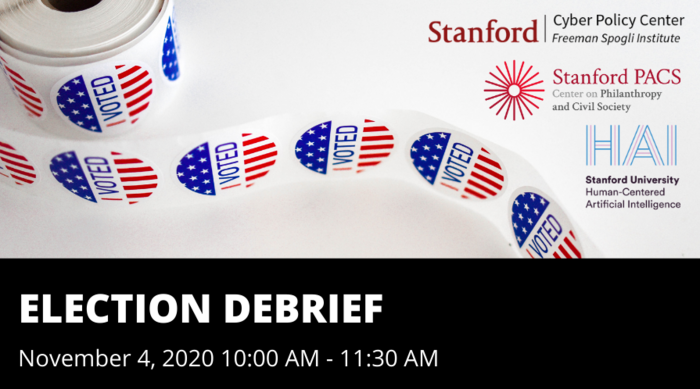Digital Technology, Social Media and the 2020 Presidential Election

Since the 2016 election, great attention has been paid to the impact of digital technologies on democracy in the United States and around the world. Foreign intervention into the U.S. campaign through social media and online advertising, including the rise of "fake news" and computational propaganda, exacerbated concerns that new technologies posed a substantial threat to the normal workings of the U.S. electoral process. These concerns remain for 2020, alongside new threats related to the COVID-19 pandemic. With in-person campaigning, voter mobilization, and even voting itself hindered by the pandemic, digital technologies promise to play an even more important role in 2020.
On December 10, 2020, the Stanford Cyber Policy Center will bring together scholars, tech platforms, principals from the digital campaigns, journalists, and other key experts to explore the effect of digital technologies on the 2020 Election. The conference will explore the role of digital technologies on election administration, campaign tactics, political advertising, the news media, foreign propaganda efforts, and the broader campaign information ecosystem. It will also consider how changes in platform policies affected the campaign and information environment, and whether lessons learned in the 2020 elections suggest that further changes are warranted.
9AM: Introduction: Kelly Born, Stanford Cyber Policy Center
9:10: Findings from the Stanford/MIT Healthy Elections Project: Nate Persily, Stanford Law School
9:30: Trends in 2020 Political Advertising: Erika Franklin Fowler, Wesleyan Media Project
9:50: Online Political Transparency: Laura Edelson, New York University Political Ads Project
10:10: BREAK
10:20: Center for Technology and Civic Life’s Elections Project: Tiana Epps-Johnson, CTCL
10:40: Platform Speech Policies and the Elections: Daniel Kreiss and Bridget Barrett, University of North Carolina at Chapel Hill
11:00: Findings from the Election Integrity Project: Alex Stamos and Renee DiResta, Stanford Internet Observatory
11:20: BREAK
11:30: Experiences from the Platforms
- Nathaniel Gleicher, Head of Cybersecurity Policy at Facebook
- Clement Wolf, Global Public Policy Lead for Information Integrity at Google
- Yoel Roth, Director of Site Integrity at Twitter
- Eric Han, Head of Safety at TikTok
12:30: Full Panel Q&A/Discussion
1PM Close



